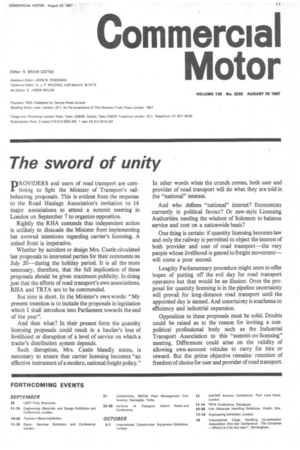The sword of unity
Page 13

If you've noticed an error in this article please click here to report it so we can fix it.
DROVIDERS and users of road transport are corn
bining to fight the Minister of Transport's railbolstering proposals. This is evident from the response to the Road Haulage Association's invitation to 16 major associations to attend a summit meeting in London on September 7 to organize opposition.
Rightly the RHA contends that independent action is unlikely to dissuade the Minister from implementing her avowed intentions regarding carrier's licensing. A united front is imperative.
Whether by accident or design Mrs. Castle circulated her proposals to interested parties for their comments on July 20—during the holiday period. It is all the more necessary, therefore, that the full implication of these proposals should be given maximum publicity. In doing just that the efforts of road transport's own associations, RHA and TRTA are to be commended.
But time is short. In the Minister's own words: "My present intention is to include the proposals in legislation which I shall introduce into Parliament towards the end of the year".
And then what? In their present form the quantity licensing proposals could result in a haulier's loss of livelihood or disruption of a level of service on which a trader's distribution system depends.
Such disruption, Mrs. Castle blandly states, is necessary to ensure that carrier licensing becomes "an effective instrument of a modern, national freight policy." In other words when the crunch comes, both user and provider of road transport will do what they are told in the "national" interest.
And who defines "national" interest? Economists currently in political favour? Or new-style Licensing Authorities needing the wisdom of Solomon to balance service and cost on a nationwide basis?
One thing is certain: if quantity licensing becomes law and only the railway is permitted to object the interest of both provider and user of road transport—the very people whose livelihood is geared to freight movement— will come a poor second.
Lengthy Parliamentary procedure might seem to offer hopes of putting off the evil day for road transport operators but that would be an illusion. Once the proposal for quantity licensing is in the pipeline uncertainty will prevail for long-distance road transport until the appointed day is named. And uncertainty is anathema to efficiency and industrial expansion.
Opposition to these proposals must be solid. Doubts could be raised as to the reason for inviting a nonpolitical professional body such as the Industrial Transport Association to this "summit-on-licensing" meeting. Differences could arise on the validity of allowing own-account vehicles to carry for hire or reward. But the prime objective remains: retention of freedom of choice for user and provider of road transport.












































































































